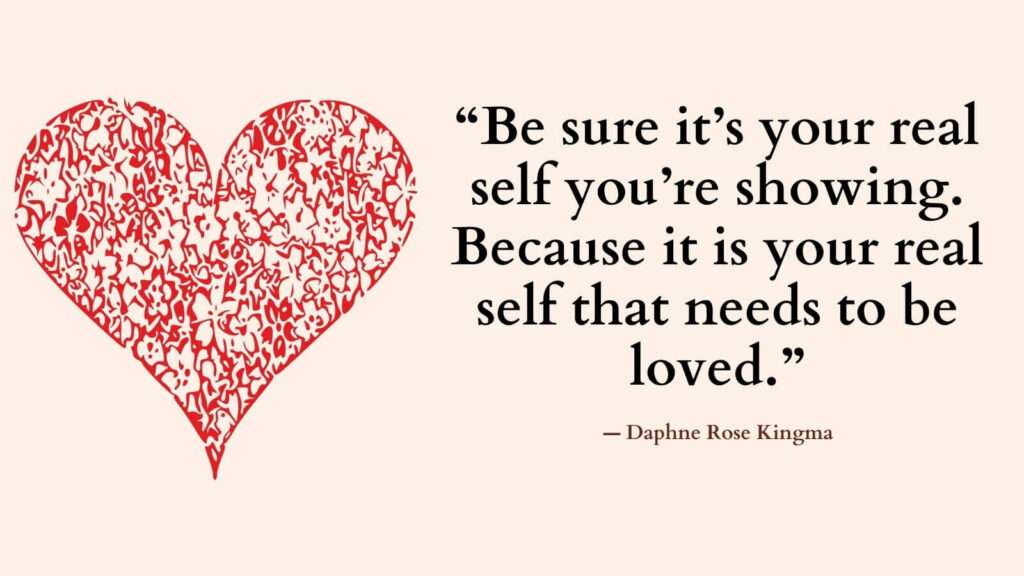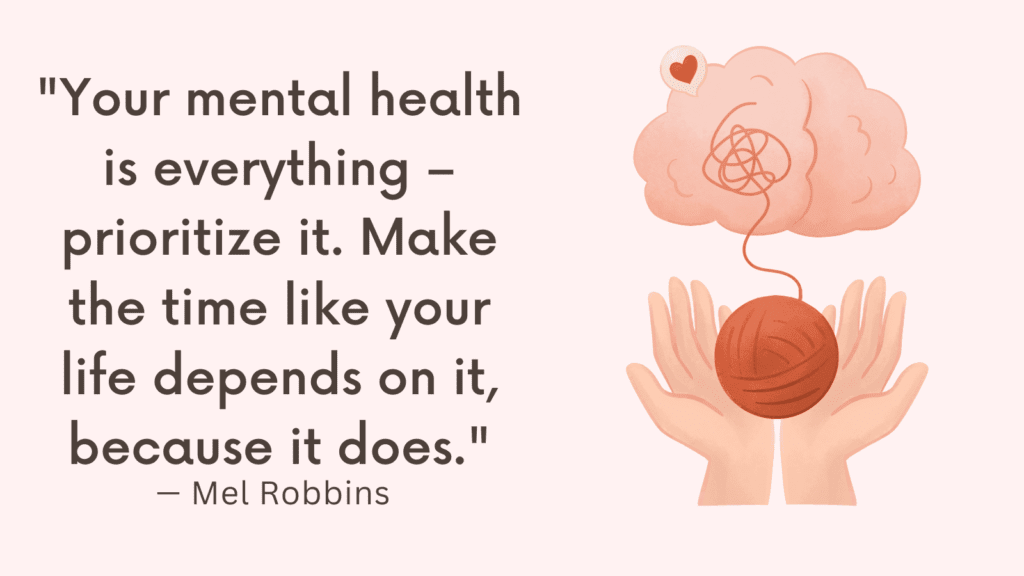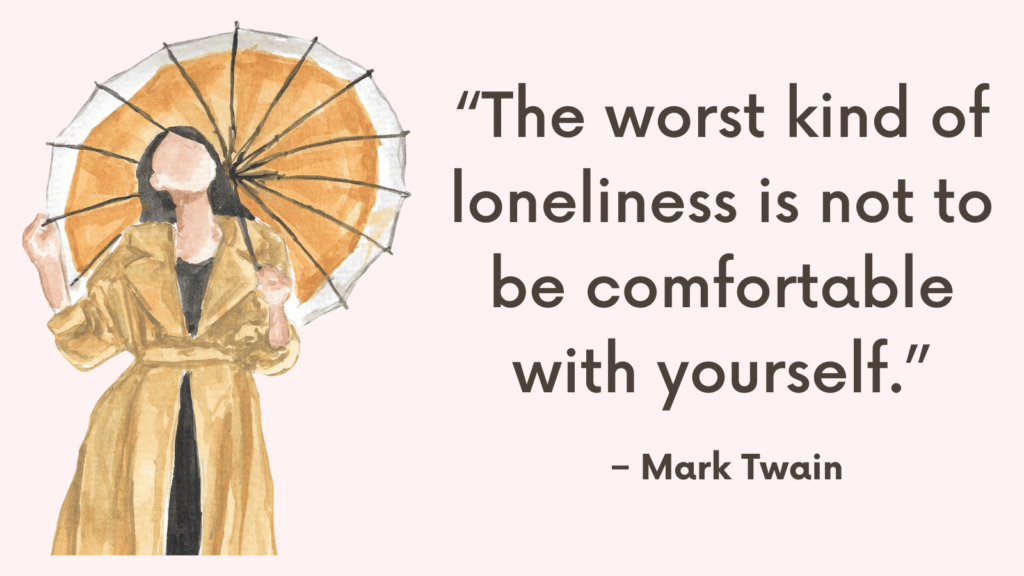This post contains “Am I lonely Quiz” along with a helpful tips to overcome loneliness.
What Is Loneliness?
Loneliness is something everyone can experience.
Loneliness is the feeling of discomfort that comes from the gap between the social connection we need or desire and our actual experience of connection.
However, chronic feelings of loneliness can become problematic.
Many mistakenly believe that if they were attractive enough or had enough money or power, they won’t feel lonely anymore. But that is not true since many people with all three are quite lonely and many people with none of these three elements have fulfilling relationships.
What Causes Loneliness?
Loneliness can be caused by situational variables, such as physical isolation, moving to a new location, divorce, the death of someone significant in your life.
Loneliness can also be a symptom of a psychological disorder like depression or PTSD, or internal factors like low self-esteem, lack of confidence, or having an insecure attachment style that affects how we relate to ourselves and others.
Am I Lonely Quiz
Many believe that you can’t be lonely when you’re surrounded by other people.
However, you could be among people you like and care about and still feel alone and separate.
The following questions represent common signs you might be lonely:
Results
#1. Do your interactions with friends and family feel superficial?
#2. Do you feel like you have no close friends who truly “get” you and that you only have casual friends or acquaintances?
#3. Do you often experience overwhelming feelings of isolation and separation even when surrounded by people, as if you’re in your own unbreakable bubble?
#4. Do you often experience painful feelings of self-doubt, low self-worth, and inadequacy?
#5. Do you often feel invisible even when you try to reach out or connect with others?
#6. Does socializing with others often leave you feeling exhausted and drained?
We will not sell your information. All results are kept confidential.
This quiz is for informational purposes only. It is not meant as a diagnostic or assessment tool.
Results
The questions above represent common signs of loneliness. If you answered yes to most of these questions, then loneliness may be a problem for you.

How to Overcome Loneliness?
#1. Increase Self-Awareness
People struggling with chronic loneliness don’t just feel disconnected from other people, they also feel disconnected from themselves.
By becoming more self-aware and tuning in to your thoughts, feelings, and needs, you become more effective at communicating these to others and getting them met.
To spend time with yourself might sound counterintuitive, this is because you haven’t been using this time effectively.
Spend quality time with yourself where you get to know yourself and do something you enjoy.
Start a journal to help you become aware of your own thoughts, feelings, and needs and schedule pleasant activities that nurture your soul.
Recommended Posts:
- Best 35 Journal Prompts To Get To Know Yourself
- Lack Of Self Awareness: 5 Signs & 5 Tips On How To Increase Self-Awareness
- Top 21 Healing Journal Prompts To Support Your Healing Journey
- Top 45 Self Care Day Ideas at Home To Kickstart Your Self Care Ritual
#2. Manage You Emotions
Chronic loneliness can cause painful feelings of depression, anxiety, shame, self-loathing, etc.
Soothing yourself is a skill you can learn and use it to manage your difficult emotions.
The following are some helpful emotion management skills:
- Naming your emotion: studies show that become aware of your feelings and labeling them decreases their intensity.
- Self-compassion: offering yourself compassion entails recognizing that this is a moment of suffering and that it’s part of the human experience. It’s the same compassion you’d offer a friend in the same situation. Such attitude can help you let go of any self-critical thoughts and allow difficult feelings to pass sooner.
- Doing the opposite action: By doing the opposite of what loneliness is urging you to do, your emotions change. For example, loneliness may push you to self-harm. Instead of acting on those urges, choose a self-compassionate activity like offering yourself words of encouragement.
- Other techniques like: deep breathing, relaxing your muscles, half-smiling technique, 333 rule for anxiety, and many other techniques can help reduce the intensity of your difficult feelings.
Related: How To Be Gentle With Yourself? Top 5 Ways To Practice Self-Compassion
#3. Spend Time With Animals
Animals can be a great company, especially if you’ve been struggling to connect with other people and need baby steps to come out of your isolation.
The presence of a pet can also be a source of comfort and relieve your stress as many studies show.
If you can’t have a pet of your own, consider looking into volunteer opportunities at local shelters or offer to take care of a friend’s of neighbor’s pet.
#4. Surround Yourself With Like-Minded People
We feel isolated most when we feel misunderstood. Meeting people with whom you have many things in common can help you feel seen and heard.
Think about causes you’re passionate about and where you can volunteer and meet people with similar passion.
Art classes or book clubs can also be great places to meet like-minded people.
Online support groups are also an option, if you’d rather meet people virtually.
Related: Borderline Personality Disorder Support Group
#5. Work With a Therapist
Our mental health issues have deep roots, and often only an experienced mental health professional can help you find them.
Psychologist Locator and the National Register are two websites for locating psychologists in the USA.
Online therapy is also an option. It can be much more affordable than in-person therapy, but can be equally effective. (source)
I recommend Online-Therapy (20% off) or Calmerry (30% off with the code CARE) for affordable online therapy.
(Disclaimer: This is an affiliate link, which means I receive a commission at no extra cost to you if you choose to use these links.)
Loneliness FREE Resources
Networking Websites
Meetup is a social networking site that allows you to find and join groups and events related to your interests.
Eventbrite is a social platform that allows you to discover upcoming events near you and get personalized recommendations.
Facebook Events helps you to easily find fun activities to do around you.
Virtual Support Groups
Support Groups Central has a wide variety of support groups from other organizations, such as the National Alliance On Mental Illness (NAMI) and re:MIND.
The Dinner Party helps groups of 20- and 30-somethings who have experienced the loss of a loved one gather in small groups called tables. Sign up for one here.
Anxiety and Depression Association of America (ADAA) offers anonymous, peer-to-peer support group with over 60,000 subscribers.
Alcoholics Anonymous offer virtual meetings. Find a virtual meeting here.
TED Talk
The paradox of loneliness | TED Talk
How to get rid of loneliness and become happy | TED Talk
You are not alone in your loneliness | TED Talk
Lessons about loneliness | TED Talk The Science of Loneliness and Isolation | TED Talk
The Simple Cure for Loneliness | TED Talk
Podcasts
The Lonely Hour: host Julia Bainbridge interviews guests about loneliness and solitude.
Information
The Loneliness Project addresses loneliness and social isolation in local communities across Australia by creating resources to connect people aligned by a common experience.
The Roots Of Loneliness Project is a comprehensive database of loneliness – written through the experience of those coping with it – we created an ever-evolving resource that has never been attempted to this scale with this level of detail and personal understanding.
References
- Portions of this article were adapted from the book Leaving Loneliness, © 2014 by the David S Narang. All rights reserved.







